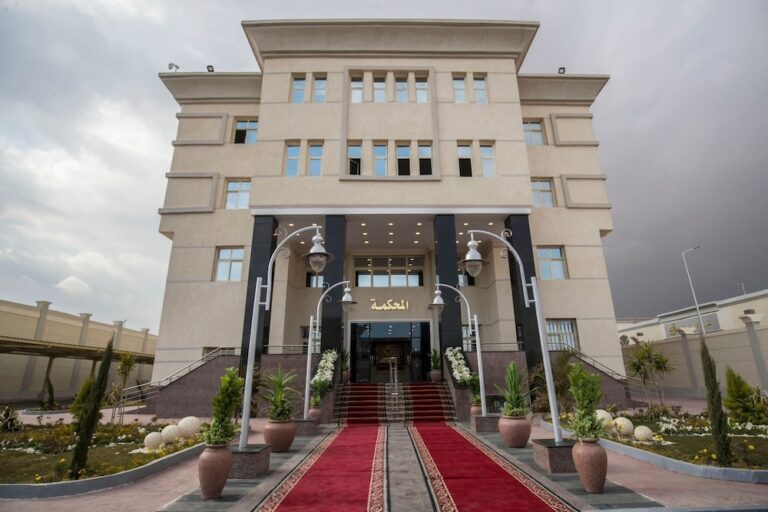(ARTICLE 19/IFEX) – The following is a joint statement by nine international human rights organizations: 17 November 2000 Egypt: Concerns about trial of human rights and NGO activists Joint Statement Amnesty International ARTICLE 19 Euro- Mediterranean Human Rights Network Human Rights Watch International Federation of Human Rights (FIDH) Lawyers Committee for Human Rights Minority Rights […]
(ARTICLE 19/IFEX) – The following is a joint statement by nine international human rights organizations:
17 November 2000
Egypt: Concerns about trial of human rights and NGO activists
Joint Statement
Amnesty International
ARTICLE 19
Euro- Mediterranean Human Rights Network
Human Rights Watch
International Federation of Human Rights (FIDH)
Lawyers Committee for Human Rights
Minority Rights Group
Observatory for the Protection of Human Rights Defenders
World Organization against Torture (OMCT)
In a statement today, nine international human rights organizations expressed concern that the trial of human rights defender Saad Eddin Ibrahim and 27 others before a Supreme State Security Court will not meet international fair trial standards. The trial is scheduled to open on 18 November 2000.
“The fact that proceedings are being held before a Supreme State Security Court raises concerns,” the human rights groups said. “Contrary to international standards for fair trial, Egyptian law does not allow for a full review before a higher tribunal of the case of any person convicted in this court.”
Verdicts can only be challenged before the Court of Cassation on procedural grounds, but not before a higher appeal court on the substance of the case.
“We are concerned that the charges against these men and women are politically motivated, and that the measures taken against them appear to be aimed at preventing them from exercising their legitimate right to freedom of expression,” the human rights groups said.
Saad Eddin Ibrahim has been charged under Article 80 (d)(1) of the Penal Code with “disseminating tendentious rumours with the purpose of undermining Egypt’s reputation”. He has also been accused of having stated that elections in Egypt are rigged and that religious persecution exists in the country.
He and the other defendants, including several staff members of two non-governmental organizations (NGOs) – the Ibn Khaldun Center for Development Studies and the Egyptian Women Voters’ Support Center – are being tried on a variety of charges. According to the indictment against the accused, issued on 24 September 2000, these include receiving unauthorized funding, forgery and bribery stemming from their work to promote voter participation and election monitoring in connection with national parliamentary elections that were conducted in October and November.
Some of the charges relate to projects funded by the European Commission aimed at promoting participation in the elections.
“This is not the first time that charges of unauthorized funding of NGOs have been brought against a human rights activist under Military Decree No. 4 of 1992 which carries several years’ imprisonment,” the human rights groups said.
Military Decree No. 4 of 1992, which sets out a minimum of seven and a maximum of 15 years’ imprisonment for unauthorized funding, formed the basis of charges against Hafez Abu Sa’ada, the General Secretary of the Egyptian Organization for Human Rights, earlier this year.
Strict regulations on foreign funding in Egypt were criticized in May 2000 by the United Nations Committee for Economic Social and Cultural Rights in relation to the now suspended NGO law.* The Committee expressed concern that the law “gives the government control over the rights of NGOs to manage their own activities, including seeking external funding.”
The charges of unauthorized funding against activists of the two Egyptian NGOs in relation to projects funded by the European Commission in Egypt appear to be in conflict with the MEDA Framework Convention within the Euro-Mediterranean Partnership Agreement, which the Egyptian government signed in February 1998.
Background Information
On 30 June 2000 human rights defender Dr Saad Eddin Ibrahim, Director of the Ibn Khaldun Center for Development Studies, was arrested at his home in Cairo together with the centre’s chief accountant, Nadia ‘Abd al-Nur. In the ensuing days several of the Ibn Khaldun Center’s staff and others affiliated to the institution were arrested and detained for days or weeks without being formally charged. At the end of August all detainees had been released from custody.
On 13 February 2000 the General Prosecution Office announced that the case against human rights defender Hafez Abu Sa’ada would be referred for trial before the (Emergency) Supreme State Security Court, under Military Decree No. 4 of 1992. However, subsequently Hafez Abu Sa’ada, who was abroad when the referral was made public, received oral assurances from the authorities that his case would not be pursued and he returned to Egypt in March 2000.
On 3 June 2000 the Supreme Constitutional Court found that the NGO law of 1999 was unconstitutional on procedural grounds.
According to Article 7 of the 1998 MEDA Framework Convention between the Egyptian government, the European Commission and the European Investment Bank (EIB): “Beneficiaries of operations financed by the Community and the EIB may be (…) private operators, cooperatives, mutual societies, associations, foundations and non-governmental organizations.”


